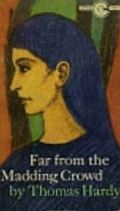The book is set in Weatherbury, where most people had never left the village. Hence there is continuity of rural life without much disturbance until newcomers like Troy and Bathsheba arrive.
Life in the rural areas is tough characterised by long working hours and few holidays. People hardly have the opportunity for advancement and poverty was always a threat. The poor could get refuge in the dreaded workhouse where one could get the bare minimum food and shelter and highlighted by Charles Dickens in Oliver Twist.
The main characters in the book are:
* Gabriel Oak, a young farmer who is practical and is outdoor most of the time. He is good humoured, hard working and expert in farming. He is ruined when most of his sheep die. He has to go and seek work and on his way, he fights a straw-rick fire and is hired by Bathsheba, the owner.
* Bathsheba Everdene is a beautiful but vain lady who inherits a farm in Weatherbury. She sends a valentine as a joke to Boldwood, a serious minded farmer. Boldwood falls in love with Bathsheba, after receiving her valentine, but Bathsheba rejects him and this sets in motion a series of events that ultimately leads to tragedy in the usually serene Weatherbury.
* Troy, a flirtatious visitor from the Army, with a dashing red uniform that has a powerful romantic appeal to young Bathsheba, seduces her with his charm, flattery and swordplay.
This was a somewhat enjoyable read, but definitely not one of my favorites. I enjoy reading about times gone by, and since most of what I read (set in earlier times, such as the Brontes' books and Anne Perry's) deals with urban life, it was very interesting to read the detailed descriptions of the rural way of life in the 19th century. As Kate said, the ending was never really in doubt, and there was no surprising plot twist. I kept hoping for something shocking, surprising, or at the very least, interesting in the plot, but it never happened. Since this was my first Thomas Hardy novel, it has made me wonder whether or not it's worth my time (or a credit!) to read more by him. His writing style doesn't make for a real easy read, either. So...interesting in its descriptions of olden rural life, and one character I liked a lot, otherwise a so-so reading experience.
First of the Wessex novels. The story of beautiful Bathsheba Everdene, a fiercely independent woman who inherits a farm and decides to run it herself. She rejects a marriage proposal from Gabriel Oak, a loyal man who takes a job on her farm after losing his own in an unfortunate accident. He is forced to watch as Bathsheba mischievously flirts with her neighbor, Mr. Boldwood, unleashing a passionate obsession deep within the reserved man. But both suitors are soon eclipsed by the arrival of the dashing soldier Frank Troy, who falls in love with Bathsheba even though he's still smitten with another woman. His reckless presence at the farm drives Boldwood mad with jealousy and sets off a dramatic chain of events that leads to both murder and marriage. -- My wife loved it.
Sometimes called "the most English of the English novels." A plot that proves life is not always boring far from the madding crowd - that the rural life has its own drama. Unforgettable characters - Bathsheba Everdine, heartbreaker and feminist prototype; Boldwood, the landowner who has always been too busy and self-contained for love; Sergeant Troy,a womanizer who cannot overlook the possibilities that Bathsheba presents; and Gabriel Oak, the steady shepherd who remains faithful through wrack and ruin to 'Mistress Everdene.'
From the back cover:
Far from the Madding Crowd is the most pastoral of Hardy's Wessex novels. It tells of the young farmer Gabriel Oak and his pursuit of the elusive Bathsheba Everdene, whose wayward nature leads her to both tragedy and true love.
The background to this compelling story is the majesty of the Wessex countryside in all its moods, making it one of the most English and great English novels.
Great classic novel. By the author of Tess of the D'Urbersvilles.
I really like Thomas Hardy's books and enjoyed this one (the !second time around)
This is a classic Thomas Hardy title in read-a-few-times.
an older novel , but as good as any put out today.....





